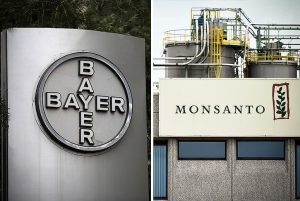Sep 16 2016
Bayer Buys Monsanto
 German company Bayer has successfully bid to buy Monsanto for $66 Billion. This merger represents the latest in the consolidation of the biotech industry that has been going on feverishly in the last few years.
German company Bayer has successfully bid to buy Monsanto for $66 Billion. This merger represents the latest in the consolidation of the biotech industry that has been going on feverishly in the last few years.
I have more questions than opinions about this merger, but there are some points worth discussing.
Consolidation
Every article and opinion I have read about the merger characterizes it as a bad thing, as a symptom of a dropping agricultural market. The story being told is this: as crop production has increased, the price of major crops in the market has decreased. This has squeezed farmers, who in turn buy less biotech products, which squeezes the seed and fertilizer companies.
Initially this resulted in the big agribusiness companies buying up many of the small local companies. Now the big companies are buying up each other in a major round of consolidation.
This is all generic business and nothing new. There is a tendency toward consolidation in large markets. Companies need to get larger to compete with other large companies, which drives a trend toward consolidation to become big. Larger companies may benefit from efficiency of size, and also are in a better position to control the market.
The huge downside to such consolidation is that it reduces competition. This is why there are anti-trust laws and why the Feds need to approach such mergers.
That is my synthesis of what everyone is saying about the merger. What I haven’t read are possible solutions to the potential problems of this industry consolidation.
I don’t understand (perhaps someone can explain it to me) why the market is not correcting itself more quickly. For example, the NYT reports about a farmer’s plight:
“We’re producing our crops at a loss now, just like the oil guys are pumping oil at a loss,” Mr. Halcomb, who grows corn, soybeans, wheat and barley on his 7,000-acre family farm, said by telephone on Wednesday. “You can’t cut your costs fast enough.”
Perhaps this is a naive question, but why produce crops at a loss? This seems to perpetuate the problem of oversupply. Reduce supply and let prices float back up.
From my perspective, the major advantage of biotech is that it allows for more crops to be produced per acre, which theoretically should allow for the use of less farm land. That would be great for the environment – allow some farmland to go fallow, and even revert to a natural ecosystem. Let the least productive or optimal farmland go first, which would increase the average efficiency of production.
Perhaps that will happen eventually. Perhaps demand will increase without the need to expand farmland, because we are already producing enough.
This could also be a role for government aid to stabilize an industry – they could purchase excess food supply and sell it or give it to countries that have too little food.
Conspiracy Theories
This is where I get frustrated when I try to understand an important topic like this. Most of the articles I find fall into two categories – there are somewhat wonky economic articles just talking about the merger from the perspective of an investor. This is business news.
There are also articles written from an environmentalist or anti-GMO perspective that talk about corporate takeover and how now the same company that makes pesticides also makes the drugs we will use to treat the diseases caused by those pesticides (this is not true, btw).
Missing in the reporting is a meaningful analysis for the average citizen.
As is typical, the conspiracy theorists mainly serve to distract from the real issues. They actually, if anything, help the corporations they oppose by making the opposition about silly and easily refuted conspiracies, rather than focusing on the real problems.
I think, as is too often the case, ideologies get in the way. In an ideal world, we would collectively leverage the power of the free market to self-regulate, while thoughtfully regulating the rules of the market to prevent abuse, perverse incentives, or monopolies. Then experts would monitor the effects and make evidence-based tweaks as necessary.
Humans, however, like to think simplistically. So we have politicians who are free-market ideologues who think the magic wand of the free market will work everything out if you just leave it alone. There are also anti-corporate ideologues who want to micromanage the market and regulate everything. We need a balance in the middle, but this means setting aside ideology and following logic and evidence. That does not seem likely in our current political environment.
Further, I wish news reporting was more meaty and delved into the issues more meaningfully. Let’s have a robust conversation about what the real issues are and what the potential solutions are.
Perhaps that discussion is happening out there somewhere, but it is hard to find. This is an area where I don’t have a lot of personal knowledge or experience to bring to bear, so I am reliant on experts to provide the analysis for me, and journalists to report on that analysis.
I’ll keep looking, but feel free to provide links to good discussions on this topic in the comments.






